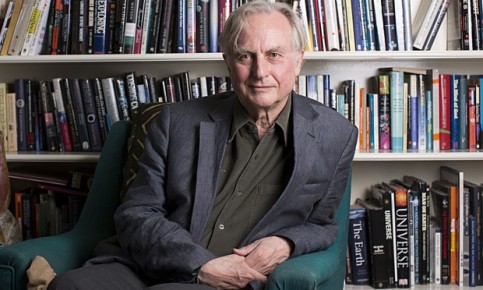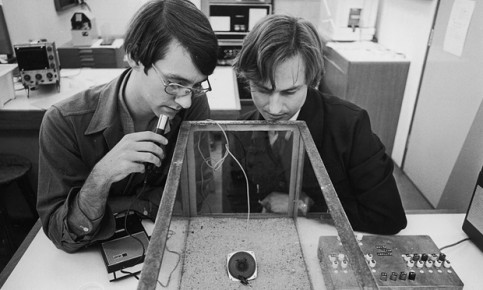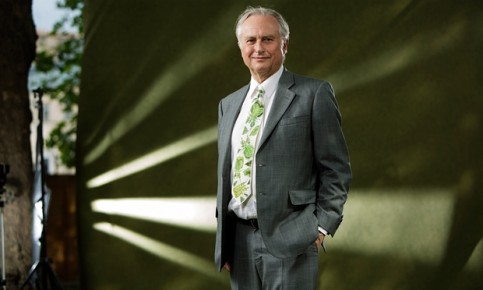Britain’s most famous atheist is surprisingly low-key. The public Richard Dawkins – combative, outspoken, relentless – is, it turns out, a different beast from the private one.
Anyone who’s witnessed a Dawkins intervention – on television, in print, or in 140 characters or fewer on Twitter – will have experienced him on fighting form: sure of his facts and opinions, unflinching in his deployment of both. In the flesh, in a room in New College, Oxford, his base for pretty much his entire working life (though he is now theoretically retired), he’s quieter, less bombastic, more human. He’s reflective, weighing up answers and expressing that most un-Dawkins-like sentiment: doubt. When I bring up his Twitter controversies, he cringes. It’s not deliberate, he says. “I genuinely and honestly don’t want to annoy people. I do want to clarify and it’s true that clarifying sometimes backfires, but my aim is always to clarify.”

But then, it was Dawkins who gave us the name for those things that go viral on the internet. Memes, he called them, inventing the word long before the internet existed. They appeared in the last chapter of The Selfish Gene, published in 1976, and there’s something fitting, perhaps, that at 74, after a lifetime of academic achievement, he gets to send out his zingers on Twitter and watch them travel instantaneously, to all parts of the globe, until they end up on the front page of some newspaper or other. (Once when trying to get across a point about grammar, he used rape as an example. “Oh God,” he says when I remind him. It’s fair to say it didn’t go well.)
It was The Selfish Gene that catapulted him into the limelight: into the public arena and the academic stratosphere. It was that vanishingly rare feat: a book that changed the world. Or at least, the way we as a culture understand ourselves, and the bits that make us up: genes. It was both a work of academic distinction and a global bestseller. It’s sold more than a million copies and has been translated into 25 languages. His latest work, Brief Candle in the Dark, the second part of his autobiography, takes up the story when he has just published his bestseller.
He’s in his mid-30s, inducted into a world presenting television series, giving distinguished lectures and gadding about at conferences in exotic places (with hints of David Lodge-style shenanigans). Not that there’s an awful lot of Dawkins-the-person in the book. It’s an inventory of places visited and people met and adventures had, and only in a couple of places does the personal leak out.
In many respects, it seems like he’s had a charmed life – massive success, the respect of his peers, the opportunity to go chasing giant squid – but he shrugs and says it’s had its up and downs. He seems to have found happiness with his third wife, Lalla Ward, an artist and actress who once played Dr Who’s assistant, but there’s a brief mention of an earlier tragedy, when his daughter and only child lost her mother, his second (already former) wife, who died of cancer.

If the publication of The Selfish Gene marked his early career success, The God Delusion, in 2006, was his later career highlight. Another bestseller, it unleashed Dawkins, the strident atheist, a figure who has perhaps eclipsed Dawkins the scientist, or Dawkins the great communicator. But it’s a shame, in some ways, or at least an imbalance. In Brief Candle in the Dark, he tells of how he engineered the endowment, by a Silicon Valley billionaire, Charles Simonyi, of the Oxford Chair for the Public Understanding of Science, of which he was the first occupant. And it’s that, the public understanding of science, that has underpinned his career and still seems to fuel him. It’s why, despite the disputes and the headlines, he’s still there tweeting his 140 characters even though his friends, including philosopher Daniel Dennett, have told him he’s in danger of blowing up his legacy. “It’s like that cartoon of a man sitting at a computer late at night,” says Dawkins. “His wife is saying, ‘Come to bed, for goodness’ sake’, and he says, ‘I can’t, somebody’s wrong on the internet.’”
But the public just may understand science a bit better because of his efforts, though I’m not sure we understand him. It turns out he’s something of a weeper. He quotes a poem his mother wrote about her dead dog. And then there’s a brief mention of the gruelling IVF that he and Lalla put themselves through. And he has a genuine awe and wonder at the world. But Dawkins the carbon-based life form, as he’d put it, tends to play second fiddle to Dawkins the scourge of unreason. There are always too many people, out there, on the internet. Needing to be corrected.
Brief Candle in the Dark opens with your 70th birthday celebration where you say that, subjectively, you “felt like a 25-year-old”. Is that still the case?
I feel pretty juvenile. I feel full of joy of life, and spring, and things like that. I don’t feel very responsible. I don’t feel very grown up.
How does that express itself?
I suppose in a fairly uninhibited way. I hope I’m always polite, but I think I tend – to use the vogue phrase – to ‘tell it like it is’. Though I do care about things. I don’t feel that it doesn’t matter what happens. I actually feel very passionately about what happens.
You were young when you wrote The Selfish Gene. Looking back, does it strike you as a young man’s book?
I don’t take back any of it which, in a way, is regrettable, because scientists rather pride themselves on changing their minds, unlike politicians, who are accused of flip-flopping. But no, I stand by the central message of The Selfish Gene, almost more so in some ways. I think the central message has been vindicated since I wrote it.
It’s amazing how much the world has changed since then, and particularly in the world of genetics, isn’t it?
Everything about biology has become almost a branch of information technology because DNA is so exactly like a computer language. That was implicit in Watson and Crick in 1953, but somehow it’s become increasingly obvious.
A lot of people talk about biotechnology as the next frontier. It seems to have the capacity to grow exponentially in the same way that computing has … does that excite you or terrify you?
It does rather excite me. I went to the first conference on artificial life in Los Alamos. I think it’s a very exciting prospect, because as a naturalist, in the philosophical sense, I’m committed to the view that there is nothing mystical or supernatural about life, and therefore in principle, it must be possible to construct life either by chemically, making your own by chemistry, or in a computer, and I find that both exciting and a bit alarming.
In what way is it alarming?
If there was a takeover, if carbon-based life was eventually suppressed and usurped by a silicon-based life. I can imagine a science-fiction look back where a pair of robotic, silicon beings sit opposite each other and discuss the possibility that way back, in some dawn age, there was some sort of soft, squishy, watery, carbon-based life forms which gave rise to us. To many people, that’s a horrifying thought, and I get that, but I think it’s exciting too.

You don’t seem to have much time for the frailty and weaknesses of most of us humans. For a lot of people, that’s where religion comes in: as a solace and comfort in dark times.
Yes, even if it’s false. There’s a rather nice remark by Steven Pinker, “If you’re being chased by a tiger, you make it a consolation from believing it’s a rabbit.” But actually, it’s a tiger.
I don’t want to go out of my way to disillusion or disabuse somebody who is in despair. But I do value truth and I do think there is a great positive value, even maybe consolation, in the truth about the real world. It is an astounding fact that we, evolved beings, have brains in our heads which are capable of understanding why we’re here and where we come from and where the world comes from and where the world’s going.
You held the chair at Oxford in the Public’s Understanding of Science. What’s the biggest gap in most people’s understanding of science?
As a biologist, it would be the amazing fact that from primeval simplicity, the laws of physics, without ever being violated, can give rise to something as prodigiously complicated as you are; that you can do mathematics and language and poetry. You do see, don’t you, what an astounding thing it is that the mere atoms, which in most of the rest of the universe just make rocks or sand; that mere atoms can be put together in staggeringly complicated ways to create something that can walk and talk and love and run and swim and think and play music and wonder.
Do you think that science is winning? In terms of providing a compelling narrative as opposed to the great world religions, or do you think it’s still got a long way to go?
If you look at the world as a whole, then it would be over-optimistic to say we’re winning. If you look at those parts of the world where education is good and where there’s a lot of social welfare so that people have time to think and to do the things they really want to do as opposed to just struggling to stay alive, in places like Scandinavia and universities, I think we’re winning there, yes.
Does it amaze you that you’re the person who coined the word meme, and you sit there and type your 140 characters, and you watch your ideas travelling out into the culture?
It’s something I couldn’t have dreamed of in 1976. I think the internet is an astonishing manifestation of the modern world. I’m intrigued by it. I think it’s an interesting idea I wouldn’t have had the idea myself. I’m surprised it works, but it does seem to work in a curious way, so it does interest me. It interests me in a mimetic way. I could imagine studying it in a detached way as a human ethnologist, using it as a test.
You’re a master of the Twitter storm, aren’t you?
I’m not sure master is the right word. Victim might be the better word.
Do you feel you’ve been terribly misunderstood, or have you enjoyed having a bit of a ruck?
I hate a bit of a ruck. They are nearly always due to misunderstandings.
What does it feel like to be in the middle of one?
I’m quite relieved not to have been the victim of a real witch hunt, like some people have, because Twitter, the internet, generally, is tailor-made for the kind of mob-rule witch hunts which, in the Middle Ages, literally ended with people being burned.
You talk about being truthful and passionate, but do you think that some of your interjections are all that helpful? For example, pointing out that 20% of Nobel prize winners have been Jews, whereas Muslims have won what you call “a derisory number”.
I think it’s staggering, that difference, because the percentage of Jews in the world is so much less, and I think there’s something genuinely interesting going on there, and I’m seriously curious, to know what it is.
One of the things that comes across in your memoir is that you’re an appreciator of women. You talk about a lecture that had gone badly and how a female friend had come along and kissed you on the head and you said something like: “Feminine tendresse — one of the reasons to go on living.”
Quite true. How’s this going to come across? Of course I’m an appreciator of women. I adore women. Not all of them, but …
What do women have that men don’t?
Tendresse, you’ve mentioned. Men have that too. What can I say? I’m a heterosexual male. I’m easily … smitten.
Do you think about ageing and death?
Yes. I don’t relish the process of dying, partly because doctors are not vets and are not allowed to put you out of your misery. But as for being dead, I think my attitude to that is … Mark Twain said it humorously when he said: “I was dead for billions of years before I was born, never suffered the smallest inconvenience.” One of the things that is potentially frightening about death is eternity, but eternity is what’s frightening, and it is so frightening that the best way to spend it would be under a general anaesthetic, which is what’s going to happen.
Do you have any regrets?
Somebody asked John Betjeman that question in his old age. The interviewer said: “John, you have lived a long and very full life. Have you any regrets?” He replied: “Not enough sex.” You can put that in as long as you say it was said in a jocular tone.

You must be logged in to post a comment Login